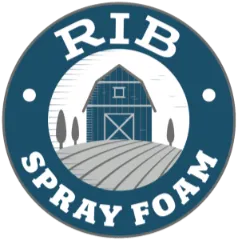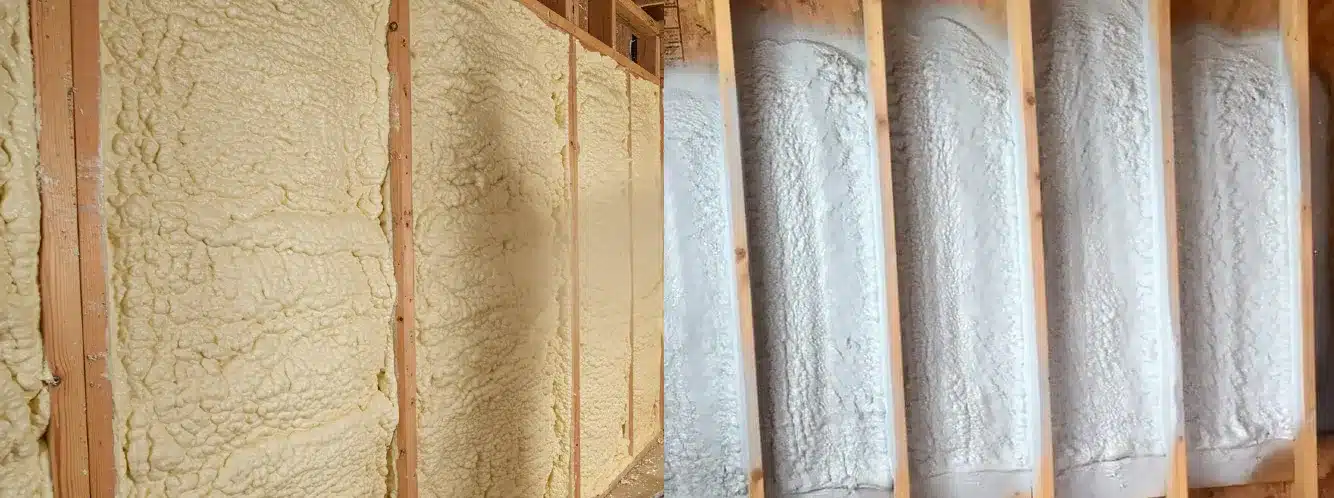When it comes to insulating your property in Arvada, choosing the right type of spray foam insulation is crucial for comfort, energy efficiency, and cost savings. Open-cell and closed-cell insulation are two popular options, each offering unique benefits and characteristics. This guide explores their differences and helps you decide which one best suits your needs.
Understanding the Basics of Spray Foam Insulation
Spray foam insulation is a versatile material used to seal walls, roofs, and other areas of a property. It expands upon application, filling gaps and providing an airtight barrier. The two main types—open cell and closed cell—are distinguished by their density, structure, and performance characteristics.
What Is Open-Cell Insulation?
Open-cell insulation is a lightweight foam with cells that are intentionally left open, giving it a soft, spongy texture. This type of insulation is typically used in interior applications.
Key Features:
- Density: lower density than closed-cell, making it lighter.
- Expansion: Expands more, covering larger areas with less material.
- Permeability: Allows water vapor to pass through, reducing moisture buildup.
- Soundproofing: Excellent at dampening noise due to its open structure.
- Cost: Generally more affordable than closed-cell insulation.
What Is Closed-Cell Insulation?
Closed-cell insulation is a rigid foam with a compact structure where the cells are entirely closed. It is denser and provides a higher level of insulation.
Key Features:
- Density: High density, offering superior thermal resistance.
- Strength: Adds structural integrity to walls and roofs.
- Water Resistance: Acts as a vapor barrier, preventing moisture infiltration.
- Energy Efficiency: Higher R-value per inch compared to open-cell foam.
- Cost: More expensive due to its enhanced performance.
Factors to Consider When Choosing Insulation for Your Arvada Property
Climate and Weather Conditions
Arvada experiences a range of weather conditions, from cold winters to hot summers. Closed-cell insulation’s higher R-value makes it better suited for extreme temperatures, while open-cell insulation works well in milder climates or interior applications.
Budget and Project Scope
Open-cell insulation is more cost-effective for large-scale projects, as it requires less material. Closed-cell insulation may have a higher upfront cost but offers long-term energy savings and durability.
Moisture Control
If your property is in an area prone to moisture, such as a basement or crawl space, closed-cell insulation is ideal due to its water-resistant properties. Open-cell foam, while not waterproof, is effective in areas where water vapor permeability is beneficial.
Structural Needs
Closed-cell insulation’s rigidity can enhance the structural strength of walls and roofs, making it a better choice for properties that require additional support.
Benefits of Spray Foam Insulation
Energy Efficiency
Both open-cell and closed-cell insulation help reduce energy consumption by minimizing air leakage. Closed-cell insulation, with its higher R-value, provides superior thermal performance.
Noise Reduction
Open-cell foam excels in soundproofing, making it ideal for homes and businesses in noisy areas.
Longevity
Spray foam insulation is highly durable and resists settling over time, ensuring long-lasting performance.
Environmentally Friendly Options
Many spray foam products are available in eco-friendly formulations, contributing to sustainable property design.
Choosing the Right Insulation for Specific Areas
Walls and Ceilings
Open-cell insulation is often preferred for interior walls and ceilings due to its soundproofing abilities and cost-effectiveness. Closed-cell insulation works better for exterior walls, where thermal resistance is a priority.
Roofs and Attics
Closed-cell insulation is recommended for roofs and attics, as it provides an effective vapor barrier and strengthens the structure.
Basements and Crawl Spaces
Closed-cell foam’s water resistance makes it the top choice for areas susceptible to moisture.
Commercial Applications
For industrial or commercial properties requiring high durability and thermal resistance, closed-cell insulation is typically the better option.
Why Insulation Matters for Arvada Properties
Proper insulation impacts more than just energy bills. It enhances comfort, prevents moisture damage, and contributes to the longevity of your property. With Arvada’s varying climate, choosing the right insulation is essential to achieving optimal performance.
Need expert advice? Contact Us
Selecting the right insulation can be complex, but expert guidance ensures the best results. At RIB Spray Foam, we specialize in helping property owners in Arvada find the perfect solution. Whether you’re upgrading insulation or starting a new project, our team is here to assist.
- Phone: (970) 645-8077
- Email: [email protected]
FAQs
How much does spray foam insulation cost?
The cost varies depending on the type of insulation, area size, and installation complexity. Open cell is generally more affordable, while closed cell provides greater long-term savings.
Is spray foam insulation safe?
Yes, when installed by professionals, spray foam insulation is safe and non-toxic.
Can I install spray foam insulation myself?
Professional installation is recommended to ensure proper application and safety.
How long does spray foam insulation last?
Spray foam insulation can last 20–30 years or more with proper installation.
Which insulation is better for soundproofing?
Open-cell insulation is better for soundproofing due to its spongy texture.
Is spray foam insulation environmentally friendly?
Many spray foam products are made with eco-friendly materials and have low environmental impact.
What is the R-value of open-cell vs. closed-cell insulation?
Open cell has an R-value of approximately 3.5 per inch, while closed cell offers an R-value of about 6.5 per inch.
Does closed-cell insulation prevent mold?
Closed-cell insulation helps prevent mold by acting as a moisture barrier.
Can spray foam insulation be used in older homes?
Yes, spray foam insulation is a great option for retrofitting older homes.
How do I maintain spray foam insulation?
Spray foam insulation requires minimal maintenance. Periodic inspections can ensure its performance remains optimal.



